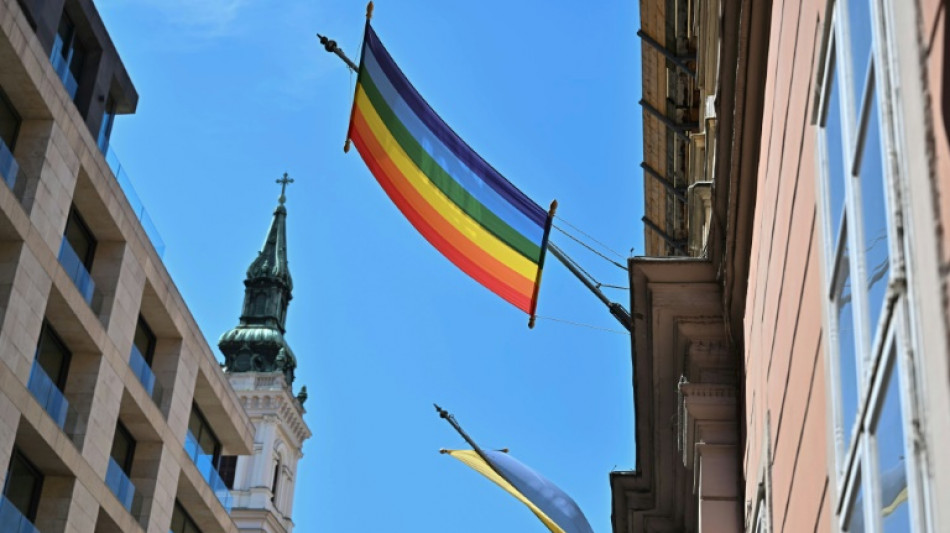
-
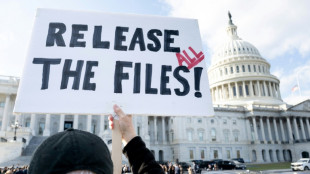 US lawmakers set for explosive vote on Epstein files
US lawmakers set for explosive vote on Epstein files
-
Gianfranco Rosi: the slow documentary maker in a frantic world

-
 P.Priime, Nigeria's young leading Afrobeats producer
P.Priime, Nigeria's young leading Afrobeats producer
-
Merz, Macron to push for European digital 'sovereignty'
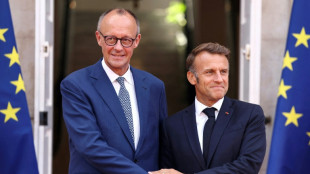
-
 Trump hosts Saudi prince for first time since Khashoggi killing
Trump hosts Saudi prince for first time since Khashoggi killing
-
Tonga's Katoa out of NRL season after brain surgery

-
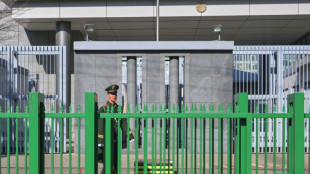 Japan warns citizens in China over safety amid Taiwan row
Japan warns citizens in China over safety amid Taiwan row
-
In Somalia, a shaky front line barely holds back the 'dogs of war'

-
 Shares in 'Baby Shark' studio jump on market debut
Shares in 'Baby Shark' studio jump on market debut
-
Thunder breeze past Pelicans, Pistons overpower Pacers

-
 Grieving Cowboys remember Kneeland, defeat Raiders
Grieving Cowboys remember Kneeland, defeat Raiders
-
Loaf behind bars: Aussie inmate says Vegemite a human right

-
 In film's second act, 'Wicked' goes beyond Broadway musical
In film's second act, 'Wicked' goes beyond Broadway musical
-
Asian markets track Wall St down with Nvidia, US jobs in view

-
 Scott Boland: the best 'spare' fast bowler around
Scott Boland: the best 'spare' fast bowler around
-
Fire and Ashes: England bank on fast bowling barrage in Australia

-
 North Korea says Seoul-US sub deal will trigger 'nuclear domino' effect
North Korea says Seoul-US sub deal will trigger 'nuclear domino' effect
-
Education for girls hit hard by India's drying wells

-
 Haitian gangs getting rich off murky market for baby eels
Haitian gangs getting rich off murky market for baby eels
-
Trump says will talk to Venezuela's Maduro, 'OK' with US strikes on Mexico

-
 Oscar Piastri wins Australia's top sports honour
Oscar Piastri wins Australia's top sports honour
-
'Severely restricted': Russia's Saint Petersburg faces cultural crackdown
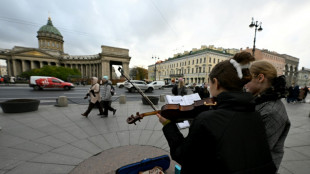
-
 Polish PM denounces 'sabotage' of railway supply line to Ukraine
Polish PM denounces 'sabotage' of railway supply line to Ukraine
-
UK toughens asylum system with radical overhaul

-
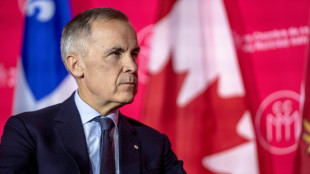 Carney's Liberals pass budget, avoiding snap Canada election
Carney's Liberals pass budget, avoiding snap Canada election
-
LeBron back in training, edges closer to Lakers return

-
 Climate talks run into night as COP30 hosts seek breakthrough
Climate talks run into night as COP30 hosts seek breakthrough
-
Germany and Netherlands lock up World Cup spots in style

-
 Germany's Woltemade hopes for 2026 World Cup spot after scoring again
Germany's Woltemade hopes for 2026 World Cup spot after scoring again
-
Germany 'send message' with Slovakia rout to reach 2026 World Cup

-
 Trump unveils fast-track visas for World Cup ticket holders
Trump unveils fast-track visas for World Cup ticket holders
-
Netherlands qualify for World Cup, Poland in play-offs

-
 Germany crush Slovakia to qualify for 2026 World Cup
Germany crush Slovakia to qualify for 2026 World Cup
-
Stocks gloomy on earnings and tech jitters, US rate worries

-
 'In it to win it': Australia doubles down on climate hosting bid
'In it to win it': Australia doubles down on climate hosting bid
-
Former NFL star Brown could face 30 yrs jail for shooting case: prosecutor

-
 Fate of Canada government hinges on tight budget vote
Fate of Canada government hinges on tight budget vote
-
New research measures how much plastic is lethal for marine life

-
 Mbappe, PSG face off in multi-million lawsuit
Mbappe, PSG face off in multi-million lawsuit
-
EU defends carbon tax as ministers take over COP30 negotiations

-
 McCartney to release silent AI protest song
McCartney to release silent AI protest song
-
Stocks tepid on uncertainty over earnings, tech rally, US rates

-
 Louvre shuts gallery over ceiling safety fears
Louvre shuts gallery over ceiling safety fears
-
'Stranded, stressed' giraffes in Kenya relocated as habitats encroached

-
 US Supreme Court to hear migrant asylum claim case
US Supreme Court to hear migrant asylum claim case
-
Western aid cuts could cause 22.6 million deaths, researchers say

-
 Clarke hails Scotland 'legends' ahead of crunch World Cup qualifier
Clarke hails Scotland 'legends' ahead of crunch World Cup qualifier
-
S.Africa says 'suspicious' flights from Israel show 'agenda to cleanse Palestinians'

-
 South Korea pledges to phase out coal plants at COP30
South Korea pledges to phase out coal plants at COP30
-
Ex-PSG footballer Hamraoui claims 3.5m euros damages against club


Budapest Pride to challenge Orban's ban in Hungary
A record number of people are expected to attend Saturday's Pride march in the Hungarian capital Budapest, defying a ban that marks an unprecedented regression of LGBTQ rights in the European Union.
Prime Minister Viktor Orban's ruling coalition amended laws and the constitution earlier this year to prohibit the annual celebration, justifying his years-long clampdown on LGBTQ rights on "child protection" grounds.
While Orban has been emboldened by the anti-diversity offensive of US President Donald Trump, his own initiatives have drawn protests at home and condemnation from the EU and rights groups.
The nationalist leader on Friday said that while police would not "break up" the 30th edition of the Pride march, those who took part should be aware of "legal consequences".
Despite the risk of a fine, more than 35,000 people are expected to gather at 2:00 pm (1200 GMT) near Budapest's city hall, an hour before the march begins.
Ministers from several EU countries, and dozens of European lawmakers are expected to attend in defiance of the ban, reminiscent of that in Moscow in 2006 and Istanbul in 2015.
"We're not just standing up for ourselves... If this law isn't overturned, eastern Europe could face a wave of similar measures," Pride organiser Viktoria Radvanyi said.
- Freshly installed cameras -
Earlier this week, EU chief Ursula von der Leyen called on the Hungarian authorities to reverse the ban.
Thirty-three countries have also spoken up in support of the march.
While parade organisers risk up to a year in prison, attendees can face fines up to 500 euros ($580). The latest legal changes empower the authorities to use facial-recognition technology to identify those who take part.
Freshly installed cameras have appeared on lamp posts along the planned route of the march.
However, opposition Budapest mayor Gergely Karacsony has insisted that no attendee can face any reprisals as the march -- co-organised by the city hall this time -- is a municipal event and does not require police approval.
"The police have only one task tomorrow, and it is a serious one: to ensure the safety of Hungarian and European citizens attending the event," Karacsony said during a briefing with visiting EU equalities commissioner Hadja Lahbib.
Far-right groups have announced multiple counterprotests along the planned route of the procession.
Justice Minister Bence Tuzson this week sent a letter to EU embassies cautioning diplomats and staff against participating because of the police ban.
Several EU countries have informed their citizens of the potential of fines through travel advisories.
- 'Polarising society' -
Since Orban's return to power in 2010, the country of 9.6 million people has been steadily rolling back LGBTQ rights.
Legal changes have effectively barred same-sex couples from adopting children, prevented transgender people from changing their name or gender in official documents, and a 2021 law forbade the "display and promotion" of homosexuality to under-18s.
This March, lawmakers passed a bill targeting the annual Pride march, amending the 2021 law to prohibit any gathering violating its provisions.
A month later, parliament also adopted a constitutional change to strengthen the legal foundations for the ban.
"Orban is employing a tried-and-tested recipe ahead of next year's election by generating a conflict," political analyst Daniel Mikecz told AFP. Orban was "polarising society", he added.
Voter opinion polls suggest Orban's Fidesz party has been losing ground to the opposition.
The first Pride march was held in 1970 in New York to mark the anniversary of the city's Stonewall riots in June 1969, which sparked the gay rights movement.
L.AbuAli--SF-PST


